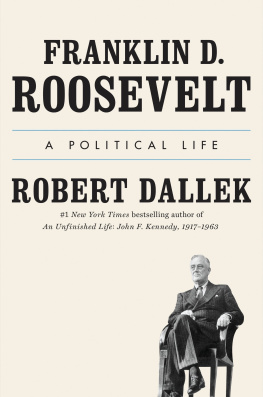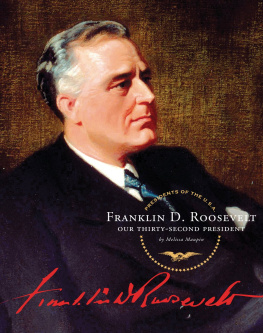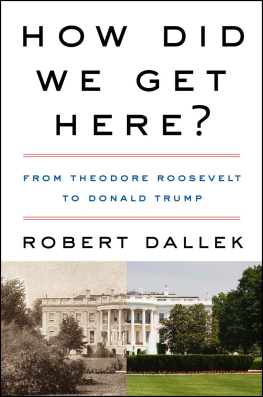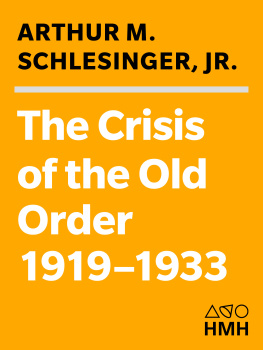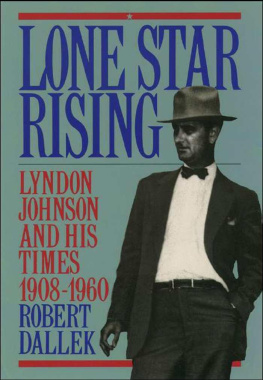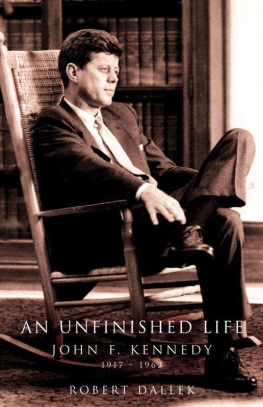ALSO BY ROBERT DALLEK
Camelots Court: Inside the Kennedy White House
The Lost Peace: Leadership in a Time of Horror and Hope, 19451953
Harry S. Truman
Nixon and Kissinger: Partners in Power
An Unfinished Life: John F. Kennedy, 19171963
Flawed Giant: Lyndon Johnson and His Times, 19611973
Hail to the Chief: The Making and Unmaking of American Presidents
Lone Star Rising: Lyndon Johnson and His Times, 19081960
The American Style of Foreign Policy: Cultural Politics and Foreign Affairs
Ronald Reagan: The Politics of Symbolism
Franklin D. Roosevelt and American Foreign Policy, 19321945
Democrat and Diplomat: The Life of William E. Dodd
VIKING
An imprint of Penguin Random House LLC
375 Hudson Street
New York, New York 10014
penguin.com
Copyright 2017 by Robert Dallek
Penguin supports copyright. Copyright fuels creativity, encourages diverse voices, promotes free speech, and creates a vibrant culture. Thank you for buying an authorized edition of this book and for complying with copyright laws by not reproducing, scanning, or distributing any part of it in any form without permission. You are supporting writers and allowing Penguin to continue to publish books for every reader.
Photograph credits: : Photo by Nate Fine, collection of the Harry S. Truman Library; other photographs from the Franklin D. Roosevelt Presidential Library & Museum.
LIBRARY OF CONGRESS C ATALOGING-IN-PUBLICA TION DATA
Names: Dallek, Robert, author.
Title: Franklin D. Roosevelt : a political life / Robert Dallek.
Description: New York : Viking, [2017] | Includes bibliographical references and index. |
Identifiers: LCCN 2017032686 (print) | LCCN 2017032870 (e-book) | ISBN 9780698181724 (e-book) | ISBN 9780525427902 (hardcover)
Subjects: LCSH: Roosevelt, Franklin D. (Franklin Delano), 18821945. | PresidentsUnited StatesBiography. | United StatesPolitics and government19331945. | United StatesPolitics and government19191933.
Classification: LCC E807 (e-book) | LCC E807 .D335 2017 (print) | DDC 973.917092 [B]dc23
LC record available at https://lccn.loc.gov/2017032686
Version_1
To our grandchildren,
Hannah, Ethan, Sammy, and Eli,
and my sister-in-law and brother-in-law,
Ellie and Bob Topolovac
CONTENTS
PREFACE
I n April 1945, soon after Franklin Roosevelt died, the New York Times, never an uncritical fan, declared, Men will thank God on their knees a hundred years from now, that Franklin D. Roosevelt was in the White House.
It was an unusual tribute to a president. As a rule, Americans are not drawn to politicians and politics but see the men and women seeking elected office as more self-serving than advocates of the public interest. In a system that puts personal gain above social reform, its little wonder that they view officeholders as primarily out for themselves. Every scandal or hint of malfeasance only deepens that conviction. Although numerous officials genuinely do work to advance the countrys well-being, all too often their efforts are lost on the public. In 2016 national cynicism expressed itself in an initial low turnout at the polls. Only 9 percent of potential voters participated in both parties primary elections. Distrust of the 2016 presidential aspirants, Republican Donald Trump and Democrat Hillary Clinton, marked a surge of disgust about the parties and their chiefs that raised doubts about the genius of American politics.
In this time of demoralization, it seems well to remind Americans that the system has been capable of generating candidates for high office whose commitment to the national interest exceeded their flaws and ambitions. In 1952, for example, mindful of the publics discontent with current events, Harry Truman stood aside and Dwight Eisenhower, a man unquestionably devoted to the countrys well-being, restored confidence in democracys ability to provide a well-regarded leader. Between 1961 and 1963, John F. Kennedy struck similar notes of faith in the government. Hubert Humphrey, who lost the presidency to Richard Nixon in 1968, has won retrospective regard by refusing to blow the whistle on Nixons wrongdoing during the campaign for fear it would provoke a constitutional crisis. Sadly, Humphreys reluctance to reveal Nixons violation of the Logan Actwhich forbids a private citizens interference in diplomatic negotiationswas a measure of decency that opened the way to Nixons presidency and the Watergate crisis. Ronald Reagans Iran-contra scandal and Bill Clintons impeachment over the Monica Lewinsky affair only deepened the growing disillusionment with politics.
Few political leaders in the countrys history have commanded as much respect as Franklin D. Roosevelt, but more than seventy years after his passing, he has become a remote figure to most Americans. It seems well, then, despite the large body of fine existing biographies, histories, and documentary collections, to remind people, especially a younger generation with limited knowledge of American history, of what great presidential leadership looks like.
The central argument of this book is that Roosevelt, like his cousin Theodore, was an instinctively brilliant politician; he certainly consulted polls, after they came into vogue in the mid-thirties, but he principally relied on his feel for public mood to guide him in leading the country. I believe that my emphasis on his political judgment goes far to set my book apart from other biographies. I also revisit Roosevelts health problems and argue that his decline began earlier than customarily described.
I have no wish to suggest that Roosevelt was an unqualified success. But then, what president has been above criticism? At the close of his two terms, George Washington complained of unmerited censures of the vilest kind. And Abraham Lincoln, probably our greatest chief executive, suffered under a barrage of attacks too numerous to recount. But grounded in his conviction that he was serving the countrys best interest, he used humor to counter public hostility. Responding to assertions that he was a two-faced liar, he said, Do you think I would keep this face if I could substitute another?
Roosevelt kept his counsel on most of the criticism that dogged him through his twelve years, though in private he was anything but passive about it. He took special exception to assertions that he wished to be a dictatoran American Hitler, Mussolini, or Stalin. Yet however much he fell short in his presidency, I especially hope that revisiting the extraordinary challenges Roosevelt faced, personally and publicly, will help rekindle faith that great political leadership is not out of reach and that the countrys finest institutions he did so much to preserve remain a source of national strength.
RD
Washington, D.C.
Fall 2016
Let us here assembled constitute ourselves prophets of a new order.
Franklin D. Roosevelt, July 2, 1932
There is nothing so exciting as creating a new social order.
Eleanor Roosevelt, December 29, 1933
P ROLOGUE
Everything to Fear
M arch 4, 1933, Inauguration Day for the thirty-second president of the United States, defied the usual temper of national renewal. Cold, overcast weather matched the countrys bleak mood. The weeks leading up to Franklin Roosevelts induction into the White House were a nightmare, as an unprecedented economic collapse had quieted the cheerleading about Americas future that business leaders, the press, and politicians had made a hallmark of the 1920s. Optimism was in short supply; voices of despair crowded out the promise of American life. In January 1933, Calvin Coolidge, the retired Republican president, said: In other periods of depression it has always been possible to see some things that were solid and upon which you could base hope. But as I look about, I now see nothing to give ground for hope, nothing of man. Herbert Hoover, the defeated incumbent, described the state of the public mind as suffering from a steadily degenerating confidence in the future which had reached the height of general alarm.... We are in a pitiful position, he said on his last day in office.... The whole economy [is] in jeopardy.... We are at the end of our string. Two months before, in a

